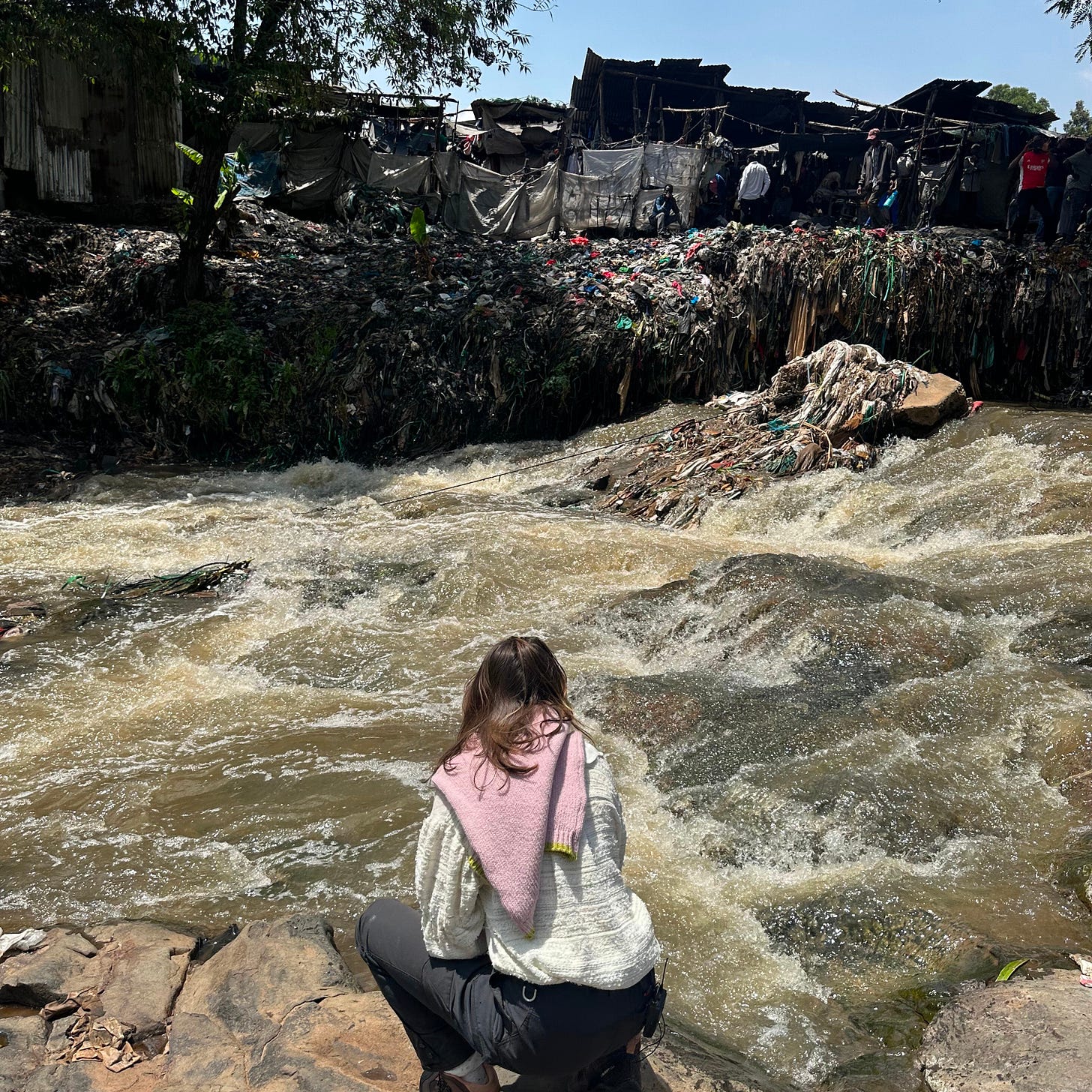
“There are huge birds circling overhead, and people, including children, picking through the waste, searching for anything of value. I had prepared myself for what I might see, but standing there, seeing the scale of it, the reality really hit home, “ said Irish designer Aoife McNamara.
She is telling me about her recent trip to Dandora, Nairobi’s main landfill site – one of the largest in the world. Receiving approximately 2,000 metric tonnes of the capital's waste daily, nothing could have prepared McNamara for the sheer reality.
“Dandora is overwhelming. It stretches as far as the eye can see, 40 acres in total with endless piles of waste, a lot of it made up of clothing. The air is thick with smoke from fires burning through the trash, and the smell of chemicals and decay is intense.”
McNamara had been in Nairobi, filming the Dandora landfill for her up and coming documentary, following fast-fashion from the Global North to South. Kenya seemed a logical destination, as it is a well-documented dumping ground for textile waste. As a sustainability advocate, McNamara felt a responsibility to witness fast-fashion’s waste crisis first hand and to tell this story once she got home.
“I never started my brand to just be a fashion brand, what I'm trying to do is so much bigger than that – it’s about people, ecosystems, and the devastating reality of overproduction and overconsumption,” McNamara said.
As a brand Aoife McNamara’s mission is to create conscious-connected fashion that exists in harmony with nature. The collections are made in Ireland, crafted locally with sustainability at the heart of its fibres and production. Uniquely, the brand also strives to raise awareness on fast-fashion’s impact, using their platform to highlight environmental and social issues and championing for a more regenerative and interconnected approach to design.
McNamara hopes to use her platform to highlight how industrialisation in the Global North disproportionately affects those already living in poverty.
“The people living close to Dandora have been forced to build their lives around this landfill, with children growing up in its shadow. They breathe in toxic fumes daily, and many make a living sorting through waste just to survive. It’s heartbreaking because they have done nothing to create this crisis, yet they are the ones suffering its worst effects.
“Seeing children playing near heaps of discarded clothes, knowing that these items were once bought on a whim in places like Ireland or the UK, was deeply unsettling.”
While speaking to McNamara, I am reminded of a quote in a Naomi Klein’s book, ‘This Changes Everything,’ which suggests that those in the Global North might be guilty of a certain ‘ecological amnesia’ – while the impacts of climate change, such as pollution might be within the realm of our knowledge, it is also very much out-of-sight, out-of-mind. This is true for the fashion sector, where clothes are sent as ‘donations’ to the Global South, most of which are dumped on communities, who have no way of managing this sustainably.
“Fast-fashion was everywhere. There were mountains of clothing with tags still attached, many of them from well-known UK and European brands. Clothes that had barely been worn, or sometimes never worn at all. The scale of waste was beyond anything I could have imagined – tonnes upon tonnes of discarded garments.”
McNamara explained that around 900 million garments of second-hand clothing per year are received in Kenya, with 40% of this being unwearable waste. Further, the lack of a functional waste system makes this a toxic site. On top of this, microplastics and toxins were leaking into the local water ways, polluting drinking water and highlighting fashion’s impact as a deeply human one. Pointing also to the fact that plastic is readily generated without any viable end-market, an issue requiring urgent mitigation.
The documentary explores the link between fashion, waste, and climate injustice. This will follow McNamara’s journey from Ireland to Kenya and Tanzania, showing the stark contrast between how clothes are consumed in the Global North and how their waste burdens communities in the Global South. McNamara hopes the tone will be honest but hopeful and does not want to shame or guilt the audience. Instead, the documentary aims to cultivate human agency and empower the audience through this knowledge, by challenging the Global North’s relationship with fashion. McNamara said:
“I don’t want people to just feel shocked or guilty, I want them to feel empowered to take action. Whether that means buying less, choosing sustainable brands, or supporting policy change, we all have a role to play. My ideal outcome would be that people walk away from this documentary inspired to rethink their relationship with fashion and become part of the movement for change.”
Usually this level of waste would remain hidden, however there is something powerful about having this in plain sight, successfully mediating a conversation on the unjust ramifications industrial pollution has on those living in poverty globally.
The documentary will be released later this year / the start of 2026, with the hope of schools and universities as a key audience. Fashion Roundtable will be hosting a screening in London and will share details on this in the coming months.







If you are in the NYC area this weekend - scroll down to performances
https://www.siburiedstories.com/
Great post. Looking forward to seeing the documentary when it comes out. This is a massive issue that I feel is too easily ignored by the global north and yet we have this: “children playing near heaps of discarded clothes, knowing that these items were once bought on a whim in places like Ireland or the UK”.